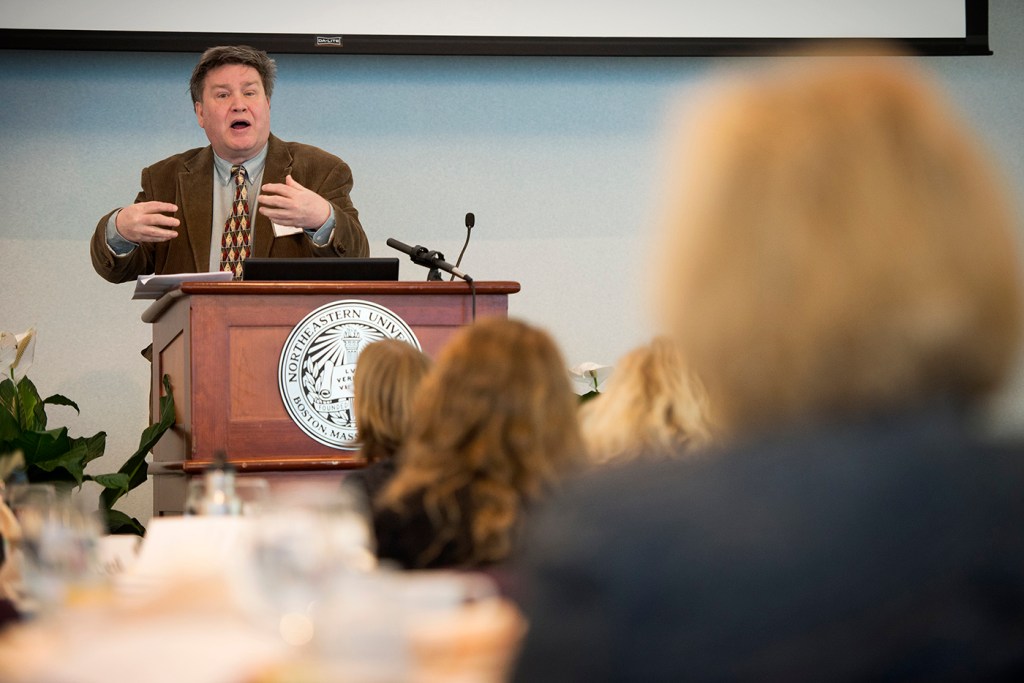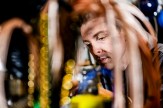Northeastern kicks-off Holocaust Awareness Week with heartrending presentation

“The images sear themselves into your heart and soul,” said Jeffrey Burds, associate professor of history at Northeastern University. “They bring you to a certain level of consciousness.”
It was Monday, and Burds was giving a slideshow presentation at Northeastern’s Holocaust Commemoration in the Raytheon Amphitheater, clicking through heartrending photographs taken during the July 1, 1941 pogrom in Lemberg, Ukraine.
Using photos, film clips, and eyewitness testimony from archives and private collections, he has spent years reconstructing the murders of more than 3,000 Jews at the hands of Ukrainian civilians.
Men and women, he told the audience of students, faculty and staff, were dragged from their homes, beaten, and then executed in the streets. Some were even chased by Ukrainian Boy Scouts and then clubbed to death.
His keynote presentation—titled “The Pogrom in Lemberg, 1 July 1941: A Local Atrocity as International History”—shed light on the capricious nature of violence. “When we focus on individual cases, we learn lessons about humanity and inhumanity,” said Burds, a former Charles H. Revson Foundation Fellow at the Center for Advanced Holocaust Studies. “Nobody dreams of becoming a perpetrator of violence,” he later added, “but once they do, they justify it in some way.”
Burds’ lecture kicked off Northeastern’s annual Holocaust Awareness Week, which is presented by the Humanities Center, the Holocaust Awareness Committee, and the College of Social Sciences and Humanities. Titled “Stories of Slave Labor and the Art of Freedom,” the educational series of events—including a panel discussion, a survivor talk, a film screening, a stage reading, and an art exhibit—aim to reflect on the Holocaust’s legacy in the 21st century.
In his introductory remarks, James C. Bean, provost and senior vice president for academic affairs, noted that Holocaust Awareness Week dovetails with Northeastern’s commitment to diversity and inclusion. “It is part of the university’s broad commitment to building civic sustainability in the country and around the world,” he explained.
After his remarks, fifth-year student Madelyn Stone delivered the Gideon Klein Scholar presentation. The Gideon Klein Award—which honors the memory of the Czech pianist and composer who died in a Nazi concentration camp in 1945—is annually bestowed upon one student, who receives $5,000 to study the work of artists who were persecuted by the Nazis.

Madelyn Stone, the 2015-2016 Gideon Klein Scholar, conducted research on the life of Jewish writer Jura Soyfer.
Stone, AMD/SSH’16, focused on the Jewish writer Jura Soyfer, who was born on the eve of World War I in present-day Ukraine and died of typhus at the Buchenwald concentration camp at just 26 years-old.
Soyfer wrote political satire, mocking systems of economic and political oppression in works that barely skirted the censor’s obstruction. His most famous work—“The Dachau Song”—was penned while he was imprisoned in the Dachau concentration camp in Germany in 1938. A sample lyric, glinting, as Stone explained, with irony: “Be a man, mate/stay a man, mate/do a good job, get to it, mate/for work, work makes you free!”
“The literary quality of his prose and poems resonates timelessly,” she explained. “His faith in humanity illuminated a brighter path for the future.”
Here’s a list of upcoming Holocaust Awareness Week events:
Philip N. Backstrom Jr. Survivor Lecture Series
Holocaust survivor Max Michelson will deliver the Philip N. Backstrom Jr. Survivor Lecture on Tuesday at noon in 909 Renaissance Park.
Michelson was born in 1924 to a large Jewish family in Riga, Latvia. By the end of World War II, most of his family and friends were dead, murdered during the Nazi occupation of his homeland. Although his mother was taken away by the police and most of his relatives were killed during the liquidation of the ghetto, he managed to survive and was sent to Magdeberg, Germany, where he was liberated in April 1945.
‘Letters to Sala’ exhibit opening and reception
The opening reception for “Letters to Sala: A Young Woman’s Life in Nazi Labor Camps,” a new art exhibit in International Village, will be held on Wednesday at 4 p.m.
The exhibit—which will be on display through Feb. 18—comprises a collection of letters, photographs, and other documents that depict 16-year-old Sala Garncarz’s five-year odyssey in forced labor camps, where she was imprisoned from 1940 to 1945.

“Letters to Sala” will be on display in International Village through Feb. 18.
Telling Sala’s Holocaust story
Sala’s daughter, Ann Kirschner, author of Sala’s Gift, will moderate a panel discussion on Wednesday at 6 p.m. in the Raytheon Amphitheater.
The panel—comprising playwright Arlene Hutton, documentarian Murray Nossel, and curator Jill Vexler—will discuss how Sala’s letters were transformed into a book, a play, an exhibit, and a documentary film.
A staged reading of Letters to Sala
A cast of more than a dozen actors will perform a staged reading of Letters to Sala, a play adapted from Sala’s Gift, on Thursday at 4 p.m. in 909 Renaissance Park.
The play was written by Hutton, directed by Paula Plum, visiting part-time lecturer in the Department of Theatre, and produced by Erika Koss, assistant dean for research, program development, and outreach in the College of Social Sciences and Humanities.
For more information on these events, visit the Holocaust Awareness Week website.





